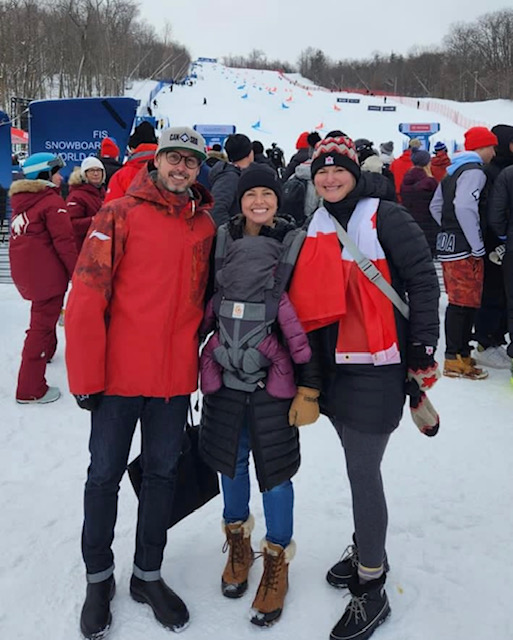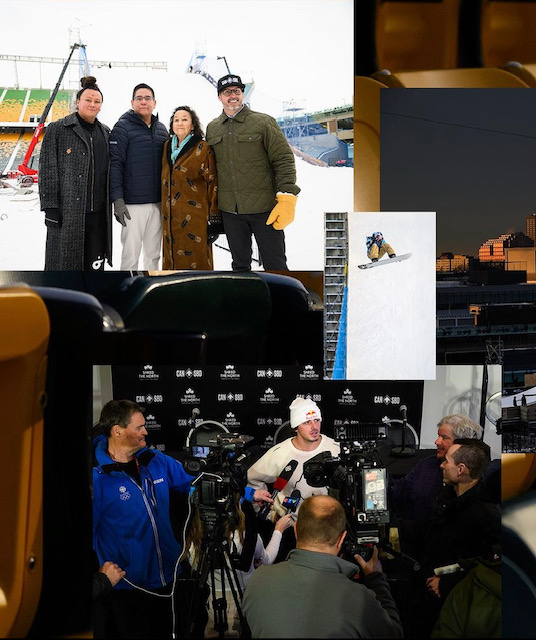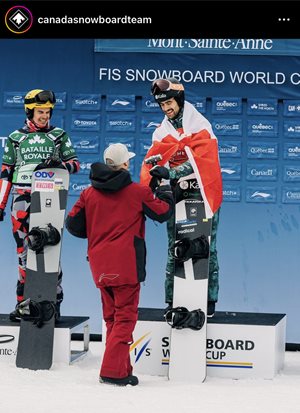ARTICLE
In the ever-evolving world of sport culture, Snowboard Canada has committed to a people-first model
To Dustin Heise’s way of thinking, the scale of ambition is roughly equivalent to, say, watching Max Parrot successfully land a Double Backside Rodeo 1440. Or Mikey Ciccarelli nail a Cab Triple 1620.
Crazy good. Audacious good. Top-of-the-global-charts good.
“We have really rallied around the idea that we don’t want to be anything short of the world-leading snowboard organization,’’ declares Snowboard Canada's chief executive officer.
“What’s the point if we’re going to do anything short of that?
“So, the Board rallies around that idea, the ecosystem rallies around that, and we define that, so everyone understands what we mean.”
In the ever-evolving world of sport culture, Snowboard Canada has committed to a people-first model to emulate. That organizational-wide belief - not faint hope or convenient lip-service, but actual belief - has, in Heise’s opinion, helped in moving the process along.

“I think the commitment, everybody wanting to meet that level of expectation meant from a staffing perspective I was able to support people and also hold people accountable,’’ he notes. “I think that trickled through the programs and then the athletes - being the number one measure of this is true or not - could start to see and feel a difference.
“Then it permeated through the entire staff.”
Lucinda Jagger is a relative newcomer to the project, named Snowboard Canada’s vice-president of sport in July of 2023.
“When I was initially interviewed for the position,’’ she recalls, “and started going through the strategic plan after some of the conversations I had with Dustin, what really impressed me … well, there’s so much opportunity in sport in Canada right now to do a great job - if we really consider a people-first culture.
“Having a passionate people-centric culture that truly believes in connecting with people with integrity. That was the real exciting thing for me because that’s where I think the real opportunity is to modernize Canadian sport and world sport; to re-define how we do our business, define our business.
“When Dustin says we want to be the world’s best, yeah, we do. We want to be the world’s best in how we think about and work with people. Because it’s so rad, so relatively new, there’s less fixed thinking. Snowboarding has a little bit of counterculture to it. Which gives us space to be super-creative and think.”
The arrival of the already highly successful Patrick Jarvis in 2015 to a three-year term as executive director is widely pinpointed as the kick-start in Snowboard Canada’s evolution to a values-based culture.
For openers, Jarvis established an athlete’s rep council.
“Patrick,’’ current lead freestyle coach Chris Witwicki praises, “is where it really all started. When he was brought in, I was the slopestyle coach at the time and we weren’t really listening to any of the athletes needs or wants - at least from my perspective.
“We were really being pushed into a position where me as a coach was being told you have to do this, this is mandatory, you just have to. And, remember, at the time we’re working with professional athletes who were the best in the world before we (Snowboard Canada) even existed. People like Mark McMorris, Max Parrot, Spencer O’Brien, who were winning the greatest accolades on the planet at the time, without any of our help.”
The hardline stance, understandably, only served to widen the gap between athletes and the program.
“There was a lot of avoidance, a lot of not wanting to be around me, as a coach at the time,’’ recalls Witwicki. “And me, as a young coach, being like ‘I think this is the right thing’ but internally, constantly having doubts.
“Then within our own staff, people were trying to get other people removed from positions. All these kind of things were going on the background. Nothing ever felt right.
“And to be honest, I wanted to quit my job multiple times because it was so difficult being in that pressure cooker.”
The arrival of Jarvis prompted “pretty swift changes” based on his observations of organizational leadership.
“What it did,’’ continued Witwicki, “was give us the opportunity to create things around how we can be a value add to these athletes who are already the best in the world, instead of trying to force them into this structure that’s totally against their nature, against our nature.”
Another drive was the fact the top athletes already had personal physio, some employed personal coaches, and were sponsored by the likes of Red Bull, Rock Star and Monster energy drinks who ran their own jump/performance camps.

“So, it forced us,’’ recalls Witwicki, “to say to ourselves: ‘OK, we have to do more. What do we have to do to be the best option?’
“That kind of laid the groundwork.”
Mercedes Nicoll now acts as an athlete council rep, a liaison between coaches, administrators and the athletes. Ten years ago, she never would’ve so much as considered taking the post.
“Just bad blood,’’ Nicoll, a four-time Olympian in half-pipe, explains. “It was really challenging and it’s still challenging for a lot of the alumni who have hurt feelings over how they were treated. It’s still not perfect, things like this take time, but it has come miles in the last 10 years.
“Patrick Jarvis started the change. Then when Dustin Heise came in, he was eager to listen and learn, not only to the athletes but to AthletesCan. He reached out to them in the beginning so that we can all work collaboratively. It’s been a seven-year process and we’re to the point where I think we’re gaining traction of collaboration and working well.
“Snowboard isn’t really like other sports in that there is camaraderie even though you’re competing against each other. I think we can really be proud of that.”
.jpg.aspx?width=500&height=336)
When Jagger began meeting with the team following her appointment, the primary question in discussion was always: What is your definition of sport?
“And consistently across the board the answers were always something about connection,’’ she recalls. “Rarely were they about winning.
“We’re in this safe sport space right now and everybody’s trying to figure it out, trying to navigate it, but it’s really about connecting in an appropriate way.”
Beginning with the Jarvis regime and moving forward to the Heis era, values and integrity have become standard watchwords. An across-the-board sabbatical has been built into the HR program to prevent employee burnout. A document was drafted entitled ‘How We Live’ to lay plain such essential intangibles as accountability. An extended welcome mat has been put out for alumni to keep them involved.
From a more athlete-practical standpoint, strength and conditioning, physio/medical support were added. So were additional jump-camps.
And, most vitally, those in positions of authority began to listen.
“One thing we got from the Navy Seals,’’ Witwicki reports, “was the saying: ‘A healthy disrespect for authority.’ What is meant by that is: Ask Why? Don’t be shy about challenging what we’re doing and saying, because if we don’t have that answer we probably shouldn’t be doing it.
“That way, it’s going to be a learning experience for all of us.”
Another of the slogans adopted in the Jarvis regime was No Mandatories/No Have To's.
“It gave a bit of a stress-relief to those athletes who then thought: ‘OK, cool, I can pick and choose what I actually feel is going to help impact me’,’’ recalls Witwicki. “And, in turn, it forced our staff and our planning in what we did for the team, to be their best option.

“We want autonomous athletes. We want them to be making the decision that’s right for them. That’s part of the character that builds champions; helps them get to the top.”
“And even if they don’t get to the top, those people still become successful in life.”
Nothing’s actually finished, accomplished, of course. Creating a culture and then maintaining it will always be an ongoing process.
But the chief executive officer’s aspiration of being top-of-the-global-charts good, the equivalent of a Mark McMorris Frontside Triple 1440, is, he believes, there for the landing.
“Building a world-leading sport organization doesn’t mean that we have the billions of dollars that professional sports franchises do,’’ notes Heise. “But it does mean that we can compete above and beyond by how we measure our values and how we maximize and return on the resources we do have.
“It is process driven, and behaviour driven. Because at the end of the day, it’s our character. That’s what we’re focused on now. Our character will define the ultimate result.
“If we’ve supported our people and our athletes, have been able to understand that’s really, truly the refinement we’re working towards, we’re going to be in real great shape.”
*****